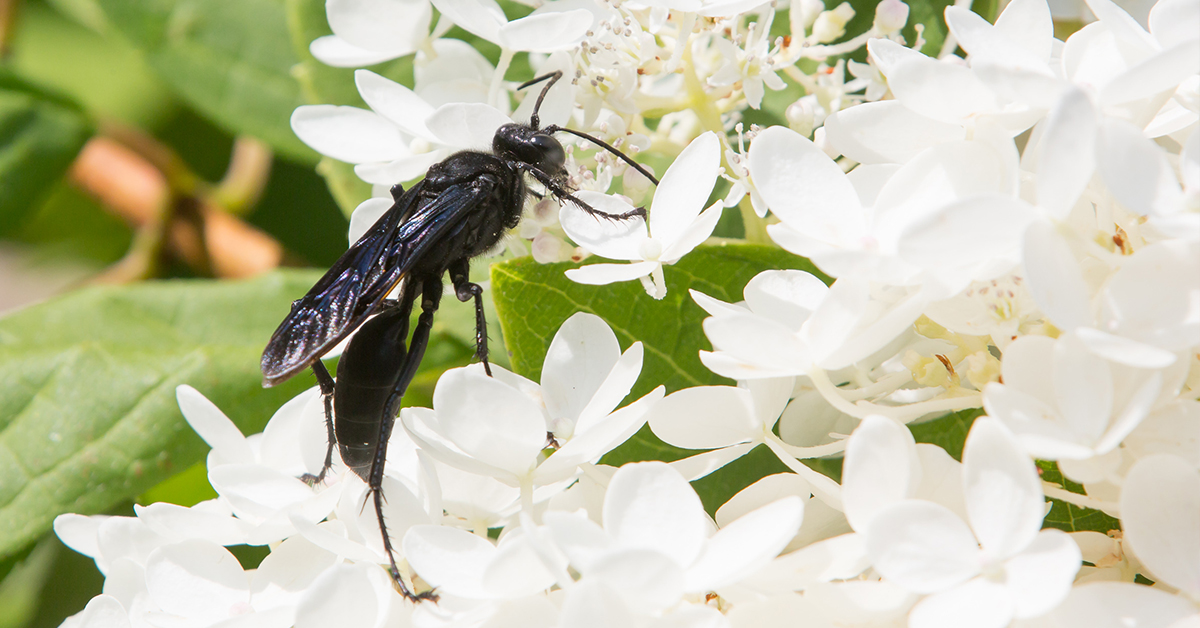Wasp encounters can be scary. These large, flying insects are known for their painful stings and aggressive nature, and some may even swarm when their nests are disturbed. But not all wasps are quite so fierce, and the great black wasp (sphex pensylvanicus) is one of these. Also known as a katydid hunter, they are a type of solitary digger wasp that can be found across North America.
What Do Great Black Wasps Look Like?
Great black wasps live up to their name. They are one of the largest wasp species, with females measuring approximately 1-1.5 inches long and males slightly less than that. Great black wasps are solid black, with no patterns or markings.
Are Great Black Wasps Dangerous?
They may look menacing, but great black wasps are not aggressive, and will sting only if provoked. They are solitary wasps, so there is no risk of encountering a swarm of them – unlike some other wasp species. A great black wasp sting may be painful, but their venom isn’t particularly dangerous to humans unless the individual is allergic to wasp stings.
What Happens If a Black Wasp Stings You?
For most individuals, the initial sting of a great black wasp may cause pain followed by minor discomfort, swelling, redness, or itching in and around the area of the sting. Those who are sensitive or allergic to wasp stings may have a stronger reaction like hives or difficulty breathing. If this occurs, seek medical treatment immediately.
What Attracts Great Black Wasps?
Great black wasps have an acute sense of smell and are drawn to sweet scents like fruit and flowers – particularly clover, goldenrod, and milkweed. It may not smell quite so sweet to humans, but wasps are also attracted to the smell of rotting cabbage, so be sure to use trash cans that seal thoroughly.
Conversely, great black wasps are repelled by certain smells. These include cinnamon, coffee grounds, cucumber, and vinegar. They also avoid strongly scented plants like basil, bay, citronella, cloves, eucalyptus, geranium, lemongrass, peppermint, spearmint, and thyme.
Where Do Black Wasps Nest?
Great black wasps nest in the ground. Female black wasps burrow into the earth (approximately a foot deep) using their mouth and legs to dig underground tunnels in which they will nest and lay their eggs. Again, they are a solitary species, so they do not live in a collective hive or have worker drones to help them build nesting sites.
How Do You Get Rid of Big Black Wasps?
Because great black wasps are solitary, you are unlikely to experience a significant population of them near your home. However, if there are larger than average numbers of them – or if someone in your family has a wasp phobia or allergy – you may wish to have them removed.
Because they live underground, they may be challenging to eradicate. A professional pest control company can locate and get rid of big black wasps (or any other wasp species) that are troubling you.
Twin Forks Pest Control® Removes Wasps and Other Pests
If you are dealing with wasps or other pests in your home or on your property, the Twin Forks Pest Control® team is here to help. We are your East End Long Island pest specialist, with decades of experience. Contact us today for a free estimate.

